Writing Tips
Help readers feel more connected to the brand story by creating smart, compelling content. Here are a few tips to keep in mind as you write.
Every statistic has a story to tell.
When we use data points and statistics we tend to lean on them too much. Instead, start by telling the story, and then support it with impressive rankings and fast facts.
We succeed when we’re specific.
We have a message and a mission. We stand for something. And we aren’t afraid to tell people exactly what that something is.
Uncover our story.
Enough about the college experience: what about our college experience? What makes us different should come across in both the information we present, and how we present ourselves — our voice, tone and personality.
Don’t bury the lede.
Before we ask our audience to wade deeper into bullet points and blocks of copy, we set things up with a theme or headline. This gives readers a reason to read on.
Three Things to Aim for
1 Tell a story.
Our people live their work and illustrate our mission in diverse and compelling ways. Make them known.
2 Show the difference.
What we do matters. Prove it through the difference our work has made.
3 Be specific.
UC Davis is a school like no other — and we show it in how we talk about ourselves. Use concrete imagery, relatable personalities, and stories with clear beginnings, provocative endings and perfectly deliberate middles.
Three Things to Avoid
1 Touting too many stats.
We have great rankings and superior numbers that other institutions would love to have. But stats are less than 52 percent of the story. We use them as underlines, not headlines.
2 Relying too much on facts.
Information must be accurate, but it needn’t be dry. Before you give the details, give readers a reason to care.
3 Playing it too wide.
We can’t be everything to everybody, and we shouldn’t try to be. Identify your audience early, think about what they need to know, and speak to their passion.
Constructing Headlines
Good headlines are good handshakes. They reach out, grab hold and make an impression. This is what the following five rubrics can help UC Davis accomplish in our communications. These aren’t the only way to compose headlines, but they’re a simple way to maintain a consistent voice and style.
1 Outdo
Pattern: Out + verb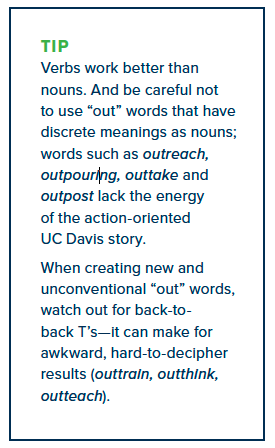
Whether it’s as a standalone word or a short series, a familiar expression or an invented one that perfectly captures your subject, this pattern is an easy way to connect headlines to the Outgrow the Expected platform. Some suggested “out” words:
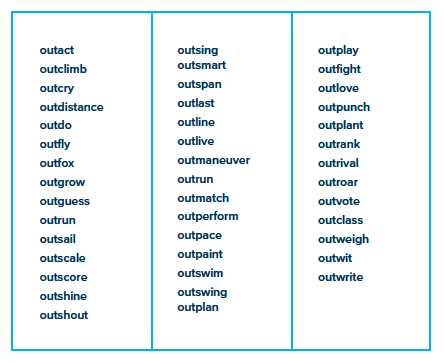
2 Build
Pattern: Sequence of ideas of increasing length
This is a subtle but powerful way to communicate growth. Start by brainstorming (or thesaurus-storming) to build a list of qualities or steps that define or relate to your subject. Then from shortest to longest, arrange the words or phrases vertically.
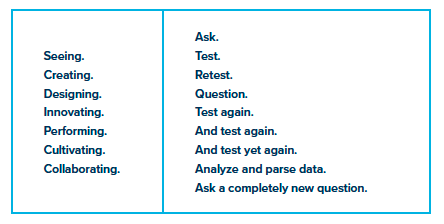
3 Expand
Pattern: Expected → More than expected
With this form, we can communicate how we outgrow, defy and surpass the expected. Begin by framing the ideal state, and then show how UC Davis transcends it.
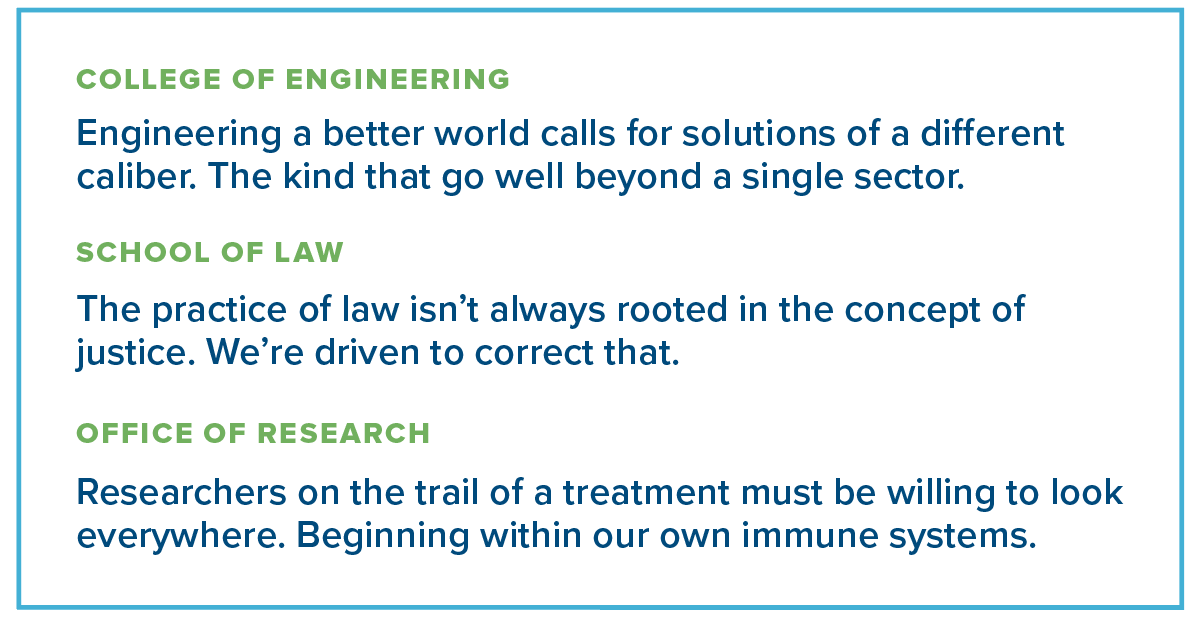
4 Repeat
Pattern: Single aspect, shared and repeated
This form challenges the assumption that focused disciplines have a narrow vision. There are common concepts across diverse aspects of every college and department. Highlight them.
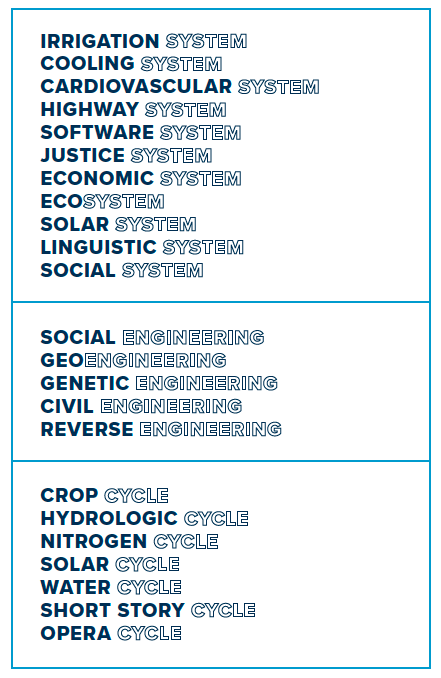
5 Generate
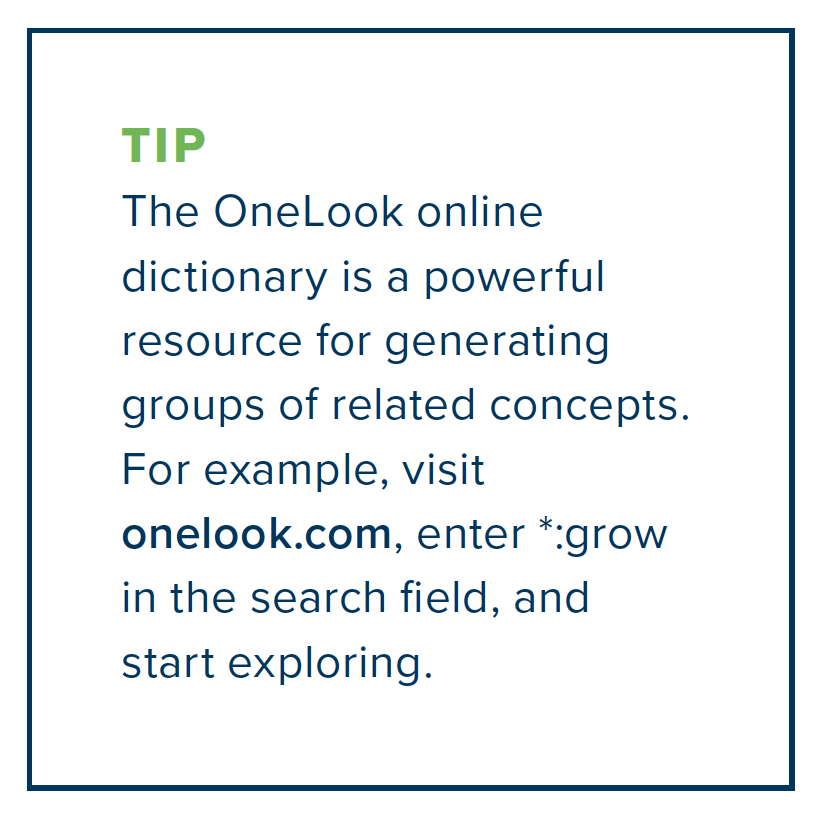 Pattern: Speaking in terms of growth
Pattern: Speaking in terms of growth
There are myriad words, idioms and concepts that connect with growth and growing. Use them sparingly to tie back to our creative platform and pay homage to our agriculture roots. Think of words like nourish, cultivate and harvest; flourish, flower and bloom; blossoming, thriving and budding; germinating, pollenating and sprouting. Don’t force it. Don’t rely on it. But when it comes naturally and feels nice (but not too cute), embrace it.
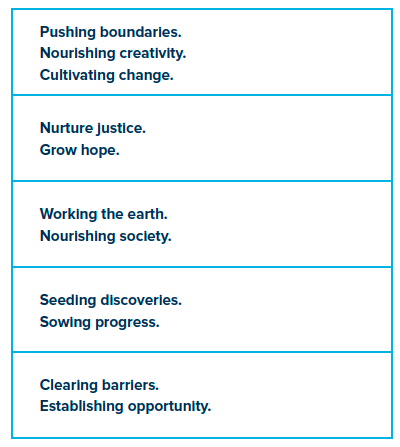
Our Brand Across Our Colleges
Here’s a look at how we might employ our different headline approaches to a tactic as simple and direct as an outdoor billboard. (Note that our second rubric, build, is left unexplored, due to the space limitations or the mediums.)
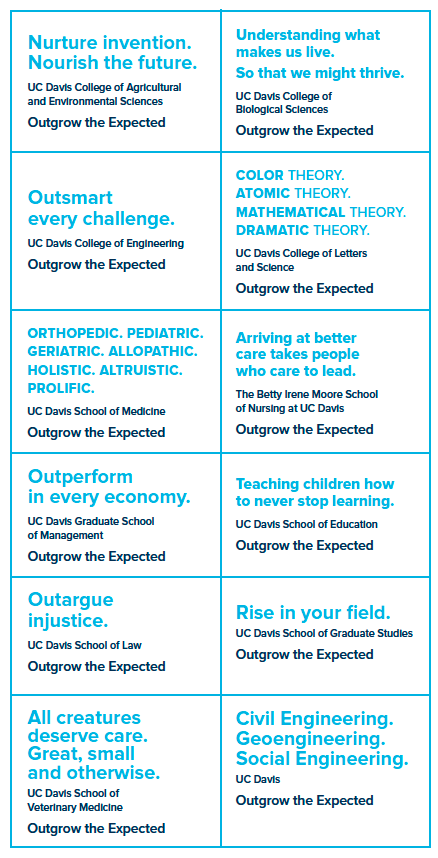
Here’s a look at how we might add subheadlines to several headline lockups.
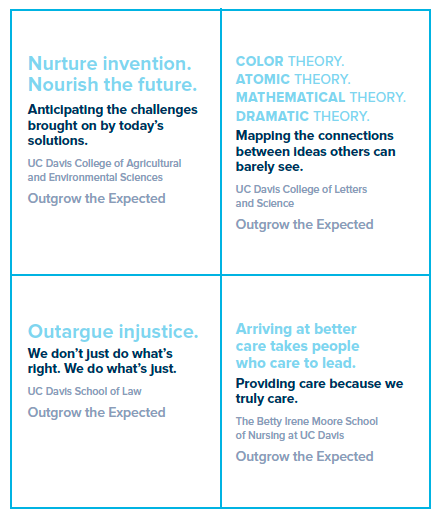
Flexing Our Tone by Audiences
Our messages remain constant, but our tone should take into account the intended audience. Here are examples of how that can be accomplished, with guidance for the different aspects of our voice that should come to the fore.
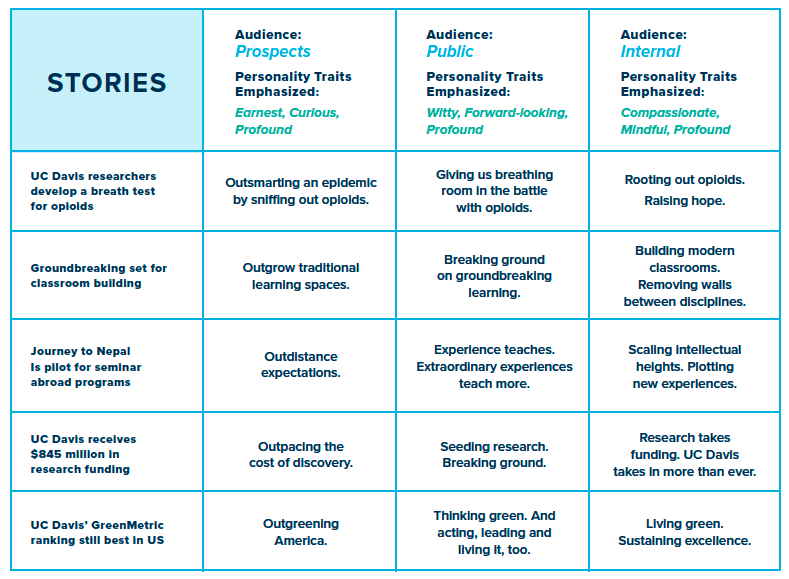
Our Story: in Brief, Briefer and Briefest
Whether in it’s an elevator, at a meet-and-greet or in a simple tweet, it’s essential that we tell the UC Davis story in a way that’s memorable and easy to digest. Here’s how that might sound:
Brief
UC Davis was founded to serve the state of California. In fulfilling that promise, we’ve become the institution we are today. We’ve gone from feeding California to feeding the world. And in every other aspect of UC Davis, we’ve outgrown expectations. Here, we stay open to ideas, work across disciplines, and attract and nurture diverse minds. It’s how UC Davis solves for tomorrow. And how we consistently outgrow the expected.
Briefer
At UC Davis, we’ve grown from feeding California to feeding the world. Our success comes from our culture of openness to ideas, working across disciplines, and attracting and nurturing diverse minds. It’s how UC Davis solves for tomorrow. And how we always outgrow the expected.
Briefest
UC Davis was founded to feed California, and we’ve gone on to feeding the world. Because we always solve for tomorrow and we always outgrow the expected.